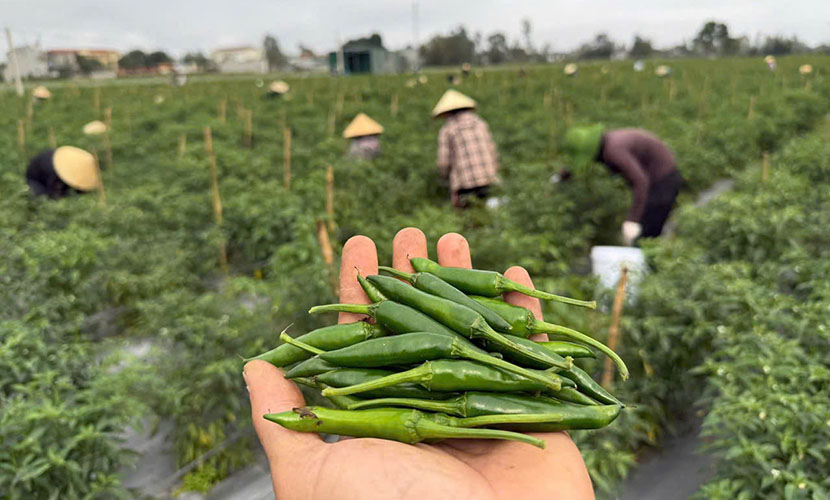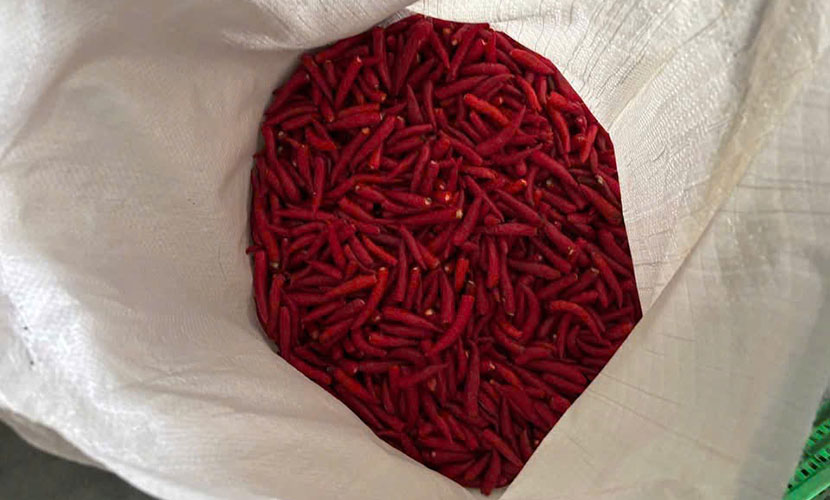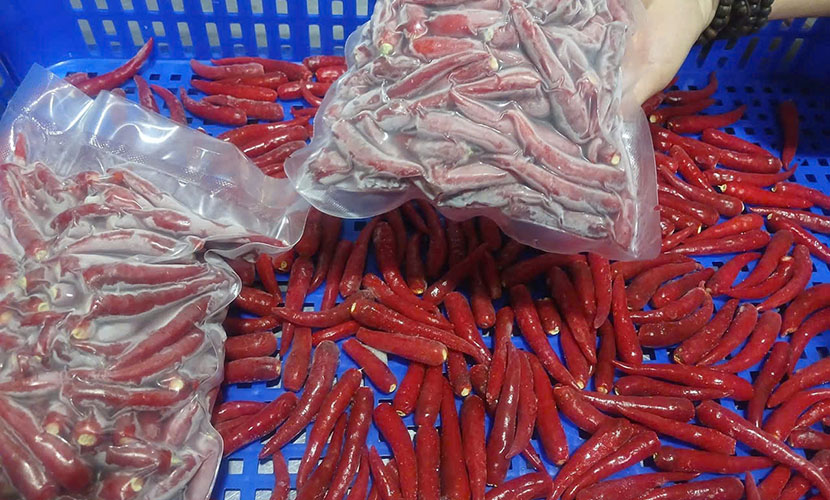
Recently, farmers of Thanh Luong commune have boldly partnered with businesses to grow organic chili peppers. These practices meet quality and safety requirements for exporting fresh chili peppers to Japan. Notably, Japan is one of the most demanding markets in terms of product standards in the world.
In the late November, the weather in Nghia Lo has become chilly. The organic chili fields of Thanh Luong commune are bustling with people tending to their crops. Chili fields planted nearly two months ago are now taking root and growing lushly green, promising a fruitful upcoming harvest.

Organic chili peppers
Ms. Heo, a local farmer, planted 1,000 square meters of organic chili peppers during the 2023 winter crop. Then she sold all the entire output for a spice company at the price of 7,000 VND/kg. The output has brought her family for more than 40 million VND in income. Seeing the promising economic returns, Ms. Heo’s family has quickly expanded to 2,000 square meters of chili.
Ms. Heo shared that the partned company provides chili seeds for her family. After about three months of care, the plants begin to bear fruit. The harvesting period lasts for 3 to 4 months. Thanks to the suitable soil, climate, and technical guidance, the chili plants yield well. Due to a stable selling price, organic chili peppers offer higher income compared to other vegetables.
Similarly, Mrs. Nga is busy setting up stakes to support the chili plants, preventing them from toppling under the weight of heavy fruiting. This winter season, her family planted 2,500 square meters of bell chili peppers provided by the company.

Fresh chili from Vietnam
According to Mrs. Nga, her family has previously used this land to grow watermelons, cucumbers, and other winter vegetables. In recent years, they’ve switched to organic chili peppers, which offer higher yields and a longer harvesting season.
Thanks to guaranteed sales through company contracts, it thereby reduces risk and ensures stable income. On average, 1,000 square meters of chili yields about 6 tons of fruit, with the company buying at 7,000 VND/kg.
To guarantee the output, a partnered company will buy all fresh chili, then process, and export to Japan. As a result, the cultivation process must follow organic standards, meeting strict requirements for quality and safety. Farmers should use fertilizers and biological chemicals under the organic guide. During harvest, the company’s technical staff conduct direct quality inspections before purchasing.

Frozen chili from Vietnam
Ms. Vy, head of the Thanh Luong Cooperative, said that after visiting a green chili farming model in Phu Tho, some households in the commune began converting their rice paddies into land for export-oriented chili cultivation. Seeing higher economic efficiency compared to other crops, more households have since made the switch.
In 2022, the Cooperative was officially established and now includes 33 members. All members commit to following proper chili-growing procedures. In addition, they should apply safe organic fertilizers and biological plant protection products. The seed sowing period begins in October, with harvesting starting by late December and ending around June of the following year.
Organic chili peppers must meet strict standards in terms of appearance, color, size, and weight. Especiallyy, they are free from disease, deformities, foreign matter, and excessive pesticide residues according to regulations.
The organic chili cultivation model for export yields economic returns several times higher than traditional crops. On average, each hectare of organic chili peppers generates 350–400 million VND per year. All chili products to the Japanese market are traceable and grow well under organic farming conditions. The chili variety used is resistant to pests and has high productivity, well adapted to the local soil and climate.

Organic chili peppers export to Japan
Mr. Lam, an expert from the partnered company stated that chili cultivation for export to Japan requires farmers to strictly follow a rigorous process. They includes land preparation, sowing, and care and harvesting.
To meet export standards, the company guides farmers to select and prepare planting areas free from chemical pollution, pesticides, or chemical fertilizers. Soil improvement is carried out using organic fertilizers, microbial fertilizers, composted manure, green manure, and organic humus to enhance soil looseness and fertility.
Additionally, a crop rotation system of one rice crop and one chili crop is applied to minimize pests and avoid nutrient depletion in the soil.
Vietnamese source: https://nongsanviet.nongnghiepmoitruong.vn/trong-ot-huong-huu-co-dap-ung-yeu-cau-khat-khe-de-xuat-sang-nhat-ban-d410814.html
